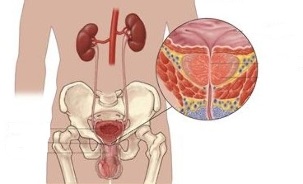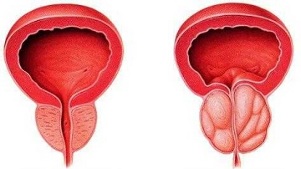The prostate or prostate is called the prostate. It is a very fragile male organ, prone to various urinary system diseases, especially prostatitis. And, despite the prevalence of the disease, the treatment of chronic prostatitis is a very difficult task.
Types of prostatitis and its causes
Prostatitis is a prostate disease, accompanied by an inflammatory process in its tissues. Prostatitis is classified according to the following data:- Acute bacterial prostatitis caused by infectious agents;
- Chronic bacterial (infectious) prostatitis;
- Chronic non-bacterial (non-infectious) prostatitis;
- Asymptomatic inflammatory prostatitis.
Chronic bacterial prostatitis-Despite many studies, the nature of this species is not yet fully understood. Due to prostate infection, this type of disease can occur in men, which may be caused by many reasons:

- Severe hypothermia;
- There is trouble emptying the bladder;
- Unstable sex life (irregular or lack of regularity);
- Chronic diseases of the genitourinary system;
- leads an unhealthy lifestyle;
- Impaired mobility.
The disease usually progresses without obvious symptoms and is only felt when the disease gets worse, accompanied by the following symptoms:
- Discomfort and incomplete emptying when urinating;
- Reduced sexual activity;
- Pain in the lower abdomen.
Moreover, chronic prostatitis can cause a variety of diseases of the bladder, transfer to the acute stage of the disease, and then a method for the treatment of chronic prostatitis has been provided.
Chronic nonbacterial prostatitis-According to all these data, the incidence rate accounts for 92-95% of all types of prostatitis, and its prevalence can be judged. There is no age limit for this disease, so it affects men of any age, but the peak average is under 30. The disease is diagnosed based on the following symptoms:
- Pain and discomfort in pelvic organs (more than 3 months);
- There is no sign of environmental infection;
- Sexual dysfunction and increased urination process.
Chronic calculous prostatitis can also be distinguished in urology, which is the result of chronic prostatitis, which is even more troublesome for elderly men.
Can chronic prostatitis be cured?
Every patient is troubled by the therapeutic effect of chronic prostatitis, because this disease not only brings a lot of special inconvenience to people, but also brings psychological trauma to men.
Considering the various directions of method application, we note that the appointment is determined by experts based on diagnostic measures. The urologist has individually developed a comprehensive prostatitis treatment plan, which includes various treatment procedures. Therefore, a comprehensive conservative approach includes:
- Drug treatment of chronic prostatitis;
- Physiotherapy;
- Manual therapy.
As mentioned earlier, experts select individual procedures to be adjusted from the overall plan, and each individual patient is a separate treatment plan for chronic prostatitis calculated by his attending doctor.
Effective treatment of chronic prostatitis mainly involves the following complementary studies:

- consultation with neuropsychiatrist, endocrinologist, cardiologist;
- Computer or magnetic resonance imaging of the brain to check its performance and structural functions;
- Hormonal status research;
- Ultrasonography of the genitourinary system.
If the patient has no symptoms, how to treat chronic prostatitis? This situation means that the patient has been relieved or the disease has no symptoms. Of course, the latter situation requires an immediate visit to a specialist who will perform all necessary procedures. The duration of treatment for chronic prostatitis is usually 2 weeks or longer, depending on the condition of the prostate and the extent of the disease.
For example, drugs used to treat chronic prostatitis need to be continuously taken in men, and this combined with the disease leads to a decrease in blood flow to the penile arteries. In order to increase the blood flow and cause erection, it is necessary to continuously take vasodilators.
Treatment of chronic prostatitis at home
If chronic prostatitis worsens, follow all the suggestions below. This is a few days of bed rest, not participating in sports activities, and refusing to drink alcohol. After eliminating the exacerbations of chronic prostatitis, it is necessary to decide how to work and rest for many years.
To prevent recurring attacks, the following basic guidelines must always be followed:
- Avoid hypothermia-First of all, even in the warm season, avoid sitting on cold ground, concrete curbs, and stones. Clothes should be loose and light, but suitable for the season. An excellent way to get rid of the worsening of chronic prostatitis is to harden the body. In this case, you can harden in the air with water for at least 1-2 hours a day, and use an air bath for hardening.
- It is very important to empty the bladder regularly to avoid overflow and long retention of urine ("intolerance", go to the toilet every 3-4 hours).
- If you have a sedentary job, you need to rest for 3-5 minutes every hour or every two hours, and then walk around to warm up. If this is not possible, you need to retract the anus 40 to 50 times in at least one way, repeating this type of exercise 4 to 6 times a day.
- Regular and moderate physical exercise is one of the most important factors to prevent the aggravation of chronic prostatitis and eliminate the congestion of the prostate and pelvic organs. The minimum for this type of activity is morning exercises every day, walking continuously for 30-40 minutes at a moderate or fast speed (ie, without stopping, not going to the store, etc. ). In addition, you need to travel to nature once a week, do viable work in the country, pick berries, mushrooms or long walks for 2-3 hours on weekends, visit swimming pools, or, in extreme cases, in a home simulator (runningExercise on the machine, rowing machine, stepper).
- If possible, rule out perineal trauma (rejecting regular professional cycling, equestrian sports, cross-country motorcycles).
- Regular sexual activity is the most important factor in eliminating prostate congestion. Moreover, temperance is very important here, that is, the relationship between sexual relations and the sexual physique of men. It is important to avoid prolonged and interrupted sexual intercourse and to have permanent sexual partners.
- Fight against constipation.
- Refusal to drink alcohol completely during the exacerbation of prostatitis, and minimize alcohol consumption during the remission period. This requires a complete rejection of beer and cheap wine.
- If possible, please exclude work related to constant nervousness, frequent tension, or work that uses automatic training and meditation to resist stress.
- Preventive visits to urologists twice a year for clinical examinations, TRUS, laboratory examinations of urine and prostate secretions and examinations after 40 years-and PSA. The implementation of these simple measures will prevent the possible aggravation of chronic prostatitis and will help strengthen the body and its defense capabilities.
How to treat chronic prostatitis with drugs?
The root cause of prostatitis is firstly various infections and sexually transmitted viruses, which then affect the urethra and are found in the prostate tissue. It should be noted that when diagnosed with chronic bacterial prostatitis, treatment includes several stages.
The treatment of bacterial prostatitis is one of the most difficult tasks in modern urology. Despite achievements in diagnosing and detecting diseases in time, only 30% of cases can be completely cured. The modern treatment of bacterial prostatitis includes multiple stages, which can clearly answer the following questions: "Has chronic prostatitis been treated and how? " Success also depends largely on the coordination of the patient-doctor chain. Therefore, the main stages of treatment:
- Analgesics-use non-steroidal anti-inflammatory drugs;
- Reduce anxiety-take antidepressants;
- Recovery of urination process;
- Local treatment-flushing
- Physiotherapy treatment;
- Targeted therapy-it is recommended to take the drugs prescribed by the doctor for the treatment of chronic bacterial prostatitis and antibiotics;
- Surgical treatment of chronic prostatitis-this method must be used in the case of urethral stricture and prostate abscess.
It should be pointed out that the treatment of chronic prostatitis with antibiotics is reasonable today, but only after the entire course of treatment is completed, it takes an average of about 2 weeks. After graduation, doctors will evaluate the results, and more often positive trends appear. Antibiotics for chronic prostatitis are used because the disease is infectious and is mainly caused by pathogenic bacteria, which inevitably requires antibiotic treatment. The key is to choose the correct medicine according to the usage plan clearly selected by the attending physician.
It should be particularly noted that when taking drugs for the treatment of chronic prostatitis, the time schedule and frequency of medication should be strictly followed.
It is worth remembering that there is no absolute method for the treatment of chronic prostatitis. Only a thorough diagnosis and compliance with all the prescriptions of experts can be cured to the greatest extent. Due to its specificity and severity, self-medication is particularly harmful to the disease.

























